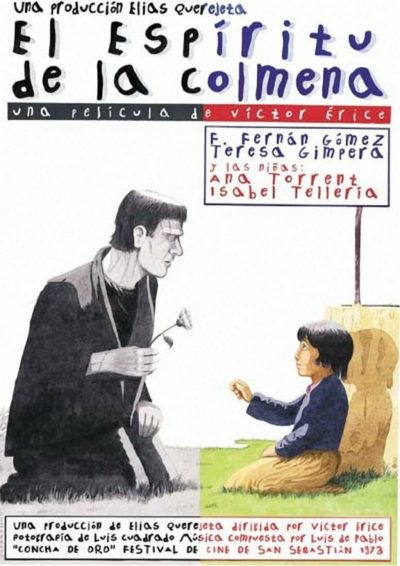 A quiet, dreamy rumination on the effect of FRANKENSTEIN on an impressionable child’s imagination. Far from standard horror fare, the 1973 Spanish film SPIRIT OF THE BEEHIVE is an extremely difficult, uneventful mood piece that requires multiple viewings—in short, an Art Film. Some will find it mesmerizing (here! here!) while others are likely to be bored to tears.
A quiet, dreamy rumination on the effect of FRANKENSTEIN on an impressionable child’s imagination. Far from standard horror fare, the 1973 Spanish film SPIRIT OF THE BEEHIVE is an extremely difficult, uneventful mood piece that requires multiple viewings—in short, an Art Film. Some will find it mesmerizing (here! here!) while others are likely to be bored to tears.
Spanish filmmaker Victor Erice made quite an impressive feature debut with THE SPIRIT OF THE BEEHIVE (EL ESPIRITU DE LA COLMENA), a blistering denunciation of the aftermath of the Spanish civil war made under the Franco regime. Erice’s dedication to his craft, evident in every frame of this film, is apparently so all-encompassing he’s only made two subsequent features (1983’s EL SUR and 1992’s EL SOL DEL MEMBRILLO).
Also debuting was actress Ana Torrent, just six years old at the time and delivering what has been widely hailed as the finest child performance in film history; her subsequent films include Carlos Saura’s CRIA! (1976), Julio Medem’s VACAS (1992) and Alejandro Amenabar’s THESIS (1996). The cinematographer Luis Cuadrado, who creates breathtaking imagery (much of it with natural lighting), also enjoyed an illustrious career; his other credits include the horror/exploitation classics WHAT THE PEEPER SAW (1972) and CUT THROATS NINE (1971).
In the early 1940’s, a traveling film show enters a rural Spanish village to show FRANKENSTEIN. Among the patrons are the young Ana and her sister Isabel, who find themselves deeply affected. Isabel convinces Ana that Frankenstein’s monster, as personified in the film by Boris Karloff, exists in reality as a spirit living in an abandoned shack situated on the outskirts of the village. As her emotionally scarred father becomes increasingly absorbed by his occupation as a beekeeper and her mother pens lengthy letters to an imaginary soldier, Ana goes in search of the monster and discovers instead a wounded Republican deserter. She becomes deeply sympathetic to the man, but he’s tracked down and killed, causing Ana to enter a hallucinatory state where the “spirit” itself visits her.
Although it follows no set perimeters of any sort, Victor Erice’s filmmaking is stunningly confident and assured from start to finish. Taken on its own terms (and there’s really no other way to take it), the film is flawless, never once compromising its dreamy veneer.
Erice favors wide shots and deliberate pacing (a static shot of a woman lying in bed lasts a full two minutes). Dissolves are also an important component, evocative as they are of listlessness and despair; dissolves provide some of the film’s best moments, such as Ana’s point-of-view shot of her face reflected in water…which turns into that of Frankenstein’s monster. Or an extraordinary fixed camera time-lapse shot that has the youthful protagonists exiting an afternoon shot and then re-entering it the next morning, all in space of a few seconds.
The latter description conveys a hint of the film’s loopy chronology, which, as stated above, spends a full two minutes on a shot of a woman in bed while only allotting a precious few seconds to the killing of a crucial character, which moreover occurs in an extreme wide shot. Such an approach may seem like a recipe for disaster, as might many of Erice’s other seemingly inexplicable quirks (like an unexpected, apparently unmotivated close up of a mushroom) yet the film definitely flows, with an editing pattern that’s emotionally rather than intellectually grounded. For those willing to surrender themselves to Erice’s unique rhythms, the experience is a hypnotic one.
Vital Statistics
THE SPIRIT OF THE BEEHIVE (EL ESPIRITU DE LA COLMENA)
Elias Querejeta Producciones Cinematographicas S.L.
Director: Victor Erice
Producer: Elias Querejeta
Screenplay: Victor Erice, Angel Fernandez Santos, Francisco J. Querejeta
Cinematography: Luis Cuadrado
Editor: Pablo Gonzalez del Amo
Cast: Ana Torrent, Fernando Fernan Gomez, Teresa Gimpera, Isabel Telleria, Ketty de la Camara, Estanis Gonzalez, Jose Villasante, Juan Francisco Margallo, Laly Soldevila, Miguel Picazo
